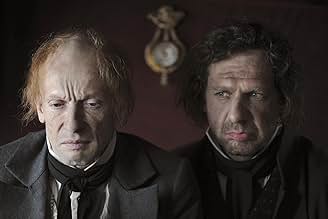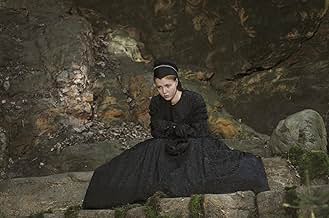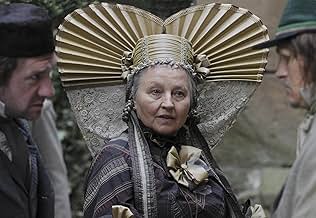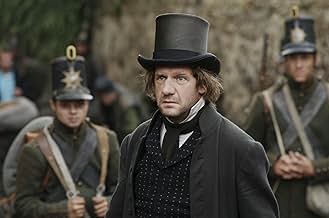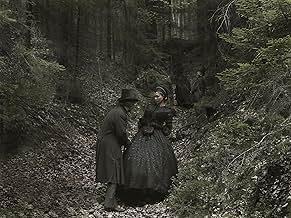NOTE IMDb
6,5/10
5,9 k
MA NOTE
Un érudit désespéré vend son âme au diable en échange d'une nuit avec une magnifique jeune femme.Un érudit désespéré vend son âme au diable en échange d'une nuit avec une magnifique jeune femme.Un érudit désespéré vend son âme au diable en échange d'une nuit avec une magnifique jeune femme.
- Réalisation
- Scénario
- Casting principal
- Récompenses
- 15 victoires et 27 nominations au total
Eva-Maria Kurz
- Faust's Cook
- (as Eva Kurz)
Avis à la une
FAUST tries a bit too hard at times to shock, or to impress with its technical aspect: the opening close-up of the rotting genitalia of a male cadaver being autopsied pretty much sets the tone; anything goes. Unfortunately, that includes some fairly simple but overused in-camera effects, like the use of distorting lenses (which add absolutely nothing to the meandering narrative and actually detract from the lavish production values). Death, himself, is a bore who waddles around in a rubber fat suit "weighing souls." "Is the world too cramped for you?" someone asks at one point. It's a question I pondered even as I watched this one unfold: having spent far too much of my time watching experimental films and video over the years, I can honestly say that- for ME- the world IS cramped with far too many such films.
a question more than a film. nothing surprising for Sokurov.because not the story is the axis but the atmosphere the air who seems be mud, the dialogues who are cold and bitter, the actors who becomes shadows. a film who propose the world in precise slices. and that is the source of controversies and the heart of a fascinating film about reality and choices. far to be comfortable, it is a challenge. because it propose the aesthetic of ugly things, because firs scene is an open corpse and the pact with devil has different nuances by the classic text of Goethe. but the idea is the same.same, the need of certitude. a film about the taste of knowledge. and the essence of self definition.
Compared to an aesthetic depiction of something like The Portrait of Dorian Gray, by Oscar Wilde, also a story of corruption, this ugly, often grotestque film, loosely based on Goethe´s Faust, is disappointing. It was a slog to get through because it was so drab and disgusting. Dust and darkness everywhere. Gross, deformed characters. Filth, misery, poverty, disease. Rats. Altogether quite unpleasant to watch. Still, I have to say that the director succeeds in creating a film as depressing as its subject: the corruption of a human being and the selling of his soul.
"Wohin?" "Dahin"
The movie opens with the Herr Doktor cutting open a rotting corpse, declaring that he has looked for man's soul and has found that there is none.
The scene is a microcosm of the film's despairing vision of modern man's immorality, descended into seeing all as mere material. In this world, the old moral code remains only in debased form: good does not exist but evil does. The film's aesthetic is ruled by filth, and everyone's body seems either decaying or malformed (bodies are all they are).
And so too has Faust's famous bargain with the devil been seriously downgraded. Goethe's Faust was foolish but noble: he signed his soul away for knowledge, a mirage of human perfectibility. Sokurov's Faust signs his off without so much as a second thought - and for what? So little! A bit of money and a bit of ass. All here is only bestial (and fleeting) pleasure. There is no longer even a dream of something better. All are selfish, mean and disgusting, loving no one, not even themselves. The film is a nightmarish verdict on modern man: he has given up the better part of himself to live like an animal, and in the end does not even realize what he has done. We the viewer are left to wonder whether there ever was a 'better part' of us at all. However, the one character who seems to recognize the fallen state of things is Faust's father, perhaps an indication that the old generation could still see the devil for what he is. Hardly hopeful, but maybe a sign that modern man's crass materialism and selfishness is not the whole story.
It begins with the evisceration of a corpse, and that could be a metaphor for the way this alleged adaptation proceeds - except that Goethe's "Faust" is not dead, only given the dead-letter treatment here. The film's emphasis is on gross, clumsy physicality: you never saw so many actors stumble as they walk, bumping into things and one another; too artless and unfunny for slapstick, the universal jostling is prevented from being laughable by funereal pacing and the array of hangdog faces. Since the Faust figure (Johannes Zeiler) conveys very little in the way of intellect, all that elevates him is that most of the other characters have been made open-mouthed gapers, presumable halfwits. Wit is barred out anyway by the color-palette, all various hues of mud - the surest sign of high-serious intentions in movies nowadays. In exterior shots the sky is overexposed so it shows as a gleamless white blur; the earth is dun-colored, greens are gray-tinged, and reds are virtually absent, on their rare appearance tending to brown, like bloodstained linens oxidizing. The cut of the men's clothing updates the story to several decades after Goethe's time: trousers are worn, rather than breeches and hose. The fabrics are thick, heavy, coarse, and of course dark-dyed and fraying badly. No one could think of playing the dandy here. Strangely, there seems to be no Republic of Letters either. The few characters with intellectual interests neither write nor receive letters; they're isolated from enlightenment and worldly affairs: no one awaits the postman; no one looks at a journal of science or politics or the arts - this is a stupefying omission, as false to the historical period as it would be to Goethe's own. Sokurov's flight from historical particulars strands his Faust: the fable and the character become "timeless" in all the wrong ways. Faust doesn't represent his age's high hopes, or its seeds of self-destruction; but then he doesn't represent our age either. Sealed off in its remoteness, Sokurov's "Faust" is just another - all-too-familiar - sulking, glooming art-house reverie.
Le saviez-vous
- AnecdotesIt won the Golden Lion award at the 2011 Venice Film Festival. It is the 3rd Russian film to be crowned best film in Venice, after Ivan's Childhood (1962) and The Return (2003).
- ConnexionsFeatured in At the Movies: Venice Film Festival 2011 (2011)
- Bandes originalesSalve Regina
(uncredited)
Gregorian chant
Meilleurs choix
Connectez-vous pour évaluer et suivre la liste de favoris afin de recevoir des recommandations personnalisées
- How long is Faust?Alimenté par Alexa
Détails
- Date de sortie
- Pays d’origine
- Sites officiels
- Langue
- Aussi connu sous le nom de
- Fausto
- Lieux de tournage
- Sociétés de production
- Voir plus de crédits d'entreprise sur IMDbPro
Box-office
- Budget
- 8 000 000 € (estimé)
- Montant brut aux États-Unis et au Canada
- 58 132 $US
- Week-end de sortie aux États-Unis et au Canada
- 10 030 $US
- 17 nov. 2013
- Montant brut mondial
- 64 556 $US
- Durée
- 2h 20min(140 min)
- Mixage
- Rapport de forme
- 1.37 : 1
Contribuer à cette page
Suggérer une modification ou ajouter du contenu manquant


